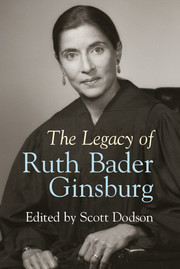Book contents
- Frontmatter
- Contents
- Contributors
- Preface
- Acknowledgments
- Part I Shaping a Legacy
- Part II Rights and Remedies
- 6 “Seg Academies,” Taxes, and Judge Ginsburg
- 7 A More Perfect Union
- 8 Barriers to Entry and Justice Ginsburg’s Criminal Procedure Jurisprudence
- 9 A Liberal Justice’s Limits
- Part III Structuralism
- Part IV The Jurist
- Notes
- Index
8 - Barriers to Entry and Justice Ginsburg’s Criminal Procedure Jurisprudence
Published online by Cambridge University Press: 05 February 2015
- Frontmatter
- Contents
- Contributors
- Preface
- Acknowledgments
- Part I Shaping a Legacy
- Part II Rights and Remedies
- 6 “Seg Academies,” Taxes, and Judge Ginsburg
- 7 A More Perfect Union
- 8 Barriers to Entry and Justice Ginsburg’s Criminal Procedure Jurisprudence
- 9 A Liberal Justice’s Limits
- Part III Structuralism
- Part IV The Jurist
- Notes
- Index
Summary
Introduction
In her twenty plus years on the United States Supreme Court, Justice Ruth Bader Ginsburg has issued momentous decisions and significant dissents concerning constitutional guarantees of equality. She is best known for her leadership – as an advocate, scholar, judge, and justice – on issues of gender discrimination. Although one might expect related commitments to civil liberties to shape cases concerning the criminal justice process, Justice Ginsburg’s mark on constitutional criminal procedure appears comparatively faint. Her contributions have been subtle, and her cautious opinions at first seem disconnected from the clear principles established in the discrimination cases.
Yet when Justice Ginsburg’s criminal procedure decisions are considered through the lens of her broader jurisprudence on equality, some common commitments emerge. The argument for “equal citizenship stature” relates to her efforts to remove the systematic barriers to entry that preclude access to the courts in criminal cases. Here too she seeks to protect the dignity of defendants facing official power. And through careful engagement with the facts of each case and a consistent focus on the prerequisites to fair adjudication, she has highlighted the due process obligations of prosecutors, demanded adequate representation of defendants, expanded the right to confront witnesses, and increased the jury’s control over sentencing determinations.
- Type
- Chapter
- Information
- The Legacy of Ruth Bader Ginsburg , pp. 102 - 116Publisher: Cambridge University PressPrint publication year: 2015



